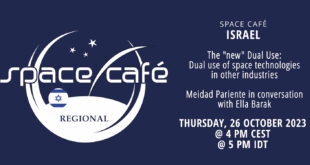
In the first episode of season 2 of Space Café Israel, Meidad Pariente is in conversation with Uri Oron, the Director General of ISA – the Israel Space Agency.
Could you share something personal that has yet to make it onto your LinkedIn profile, offering us a glimpse into a lesser-known aspect of your life?
My LinkedIn page could be more appealing. I became a fighter pilot because I wanted to be an astronaut. I was born in a kibbutz. People need to learn what it is. It’s a tiny, tiny village. It was a place with one TV for the whole community. And I remember, around the age of four, that I was taken to see a man on the moon. It was Apollo 16 because I was just about that age. Because before that, I was too little. And I remember the picture in black and white of someone walking on the moon. And it just made me fascinated with space. I started to read a lot of things about space. And I realized that to be an astronaut, you need to be a pilot. So, the road ahead to a very long career with the Israeli Air Force started there. So here’s a fact that only a few people know about.
Over the past 15 years, the Israeli Air Force underwent significant transformation, evolving into the Israeli Air and Space Force. And in your military service, you played a role in that transition. Can you share your thoughts at the time regarding what you thought about the Israeli space industry as a client?
Well, it’s even broader than that because I’ve had a chance to be involved in a few revolutions in the Israeli Air Force. One of them is very well known, the missile defense “Iron Dome.” You can make that revolution happen. It took a while for Iron Dome to be established as an actual capability. What we see in the space domain is it took the Israeli Defense Forces some time to grasp the real potential of space to become another domain of activity that helps us achieve our goals. So, it was almost natural for the Israeli Air Force to look up to space. It was not obvious, though. It took us a while.
Going back no more than ten years, you’ll see a fundamental change in understanding the potential of space for the Air Force. And it happened like it always happens. A tiny group is trying to find the right path and the proper connection between a new technology and what this technology could achieve for us. So, it was always a tiny group of people. Some could say dreamers or thinkers, but yes, some of us are dreamers and thinkers. And it took us a while. But what you can see is this change is happening. It’s not happening only in Israel. It’s happening in other countries. You can see Space Forces emerging everywhere. It’s much more of a broader discussion about the role of space in national security. You could say it’s because space has become more and more achievable. More and more nations understand they must-have assets in space. So, I see it was a very natural path. It took us a while to get there, but we are moving forward when we understand the importance of space for national security and other countries. So, in that regard, what you see is the same as we saw in other revolutions in strategic issues.
For every question you want to ask about space capabilities, someone can answer in Hebrew. So, it’s extensive when you look at the potential of the know-how in Israel. The potential is enormous. On the other hand, Israel is too small to be considered a market, but it’s a hell of a beta sight. I wonder if a space company emerging from Israel will be a crucial player like Mobileye or Checkpoint in their fields. What we need to do as a government entity is to bring them the means so they can play. We need to make them flourish. That is our role.
Is anything related to space considered dual use? Should we refrain from using that definition, especially once we have goals to promote the commercial civilian market?
I would prefer to avoid seeing the limitations there. Going back to history, an airplane is dual-use. Yes, a fighter airplane is for specific goals, but an airplane is dual-use. On the other hand, a boat is a dual-use and any other means of transportation to reach a specific domain. What you must understand is YES, space is dual-use. Space technologies and capabilities, not all of them, but a lot of them, could be useful for Homeland Security and defense. The question is where exactly you put the boundaries, where exactly you put the line. Sometimes, the lines are very bold, stringent, and very clear. Sometimes, it’s a broken line, something that you can cross. For example, Earth observation can be used for defense and homeland security on one hand and precision agriculture on the other hand. The same products from the same satellite, at the same time, could be used for both applications. Do we want to launch two separate satellites for that reason, or do we want to use one space asset in multiple ways?
Based on your experience, what would you advise the so-called emerging space countries to chart a course of space domain development, considering both their similarities and differential differences with Israel?
The first thing to do is to aim toward one or two projects. I don’t want to use the term “big,” but they should be significant projects that bring two things. The first one is awareness in those societies of the potential we see in space. The second one will be to build the first building blocks of a space sector. It could be a satellite, some scientific mission in the ISS, or other things, but it must be something that will elevate the understanding of the use of space to benefit this specific nation. Otherwise, it will lie in other technology capabilities, I think what must be done is to put it on a different level. And that will change the course of using space and those nations we have it with, with others with our missions, including Ilan Ramon, the first Israeli astronaut, but it was also with other missions. And that will probably be one of the most important things to do with those agencies.
Envisioning the future, what are your expectations for the Israeli space industry In the year 2050? And when will we see the ISA operating center controlling Isa satellites?
The second question is easy. An ISA operating center will be an Israeli operating center, not necessarily only of the Israeli Space Agency. But we’ll see that within the, let’s say, six or seven years, this is something that could be done. We are heading that way. Returning to your vision question, where do I want to see the Israeli space ecosystem in 2050? I would love to see the Israeli space sector as a crucial factor in the high-tech industry. We’ll be able to achieve, you know, a contribution of hundreds of billions of shekels to the Israeli economy within the year 2050. I would love to see hundreds of space companies working in Israel. And if we all look at the startup nation as an example, the cyber and AI sector is flourishing in Israel. I would love to see Israel’s flourishing space ecosystem space sector in 2050. That’s achievable. Last but not least, I would love to see Israeli women and men walking on the moon and on other planets in our universe, wearing the Israeli flags on their shoulders, I think that by 2050, we’ll be able to achieve the number of at least a couple of those astronauts taking our vision to the rest of the universe.
Uri Oron With a distinguished career spanning over 30 years at the IAF, Uri’s vast experience includes serving as the head of the IAF Intelligence Division. Uri was also a fighter pilot and base commander. Uri has a Bachelor’s degree in Liberal Arts from Auburn University at Montgomery and a Master’s in Political Science from the University of Haifa.
 SpaceWatch.Global An independent perspective on space
SpaceWatch.Global An independent perspective on space




